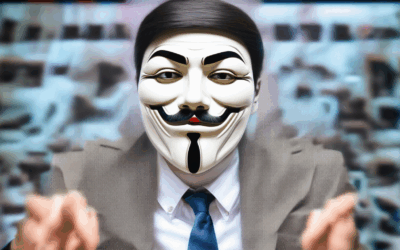In today’s rapidly evolving digital landscape, the concept of anonymous speech has become a cornerstone of public discourse, particularly in response to current events. While the ability to express oneself without revealing personal identity offers significant benefits, it also raises intriguing questions about accountability, privacy, and the boundaries of free expression. From protecting whistleblowers to fostering political dissent, anonymous speech plays a pivotal role in shaping public opinion and driving change. However, it also poses challenges, such as the potential for misinformation and the erosion of personal responsibility in cyberspace. As we navigate this complex terrain, it becomes clear that understanding the nuances of anonymous speech is essential for anyone seeking to engage with modern societal dynamics. This article delves into the multifaceted nature of anonymous speech, exploring its pros, cons, and the legal frameworks that govern it, while offering valuable insights into its impact on contemporary society.
Key Takeaways
- Anonymity enhances free speech by allowing users to express themselves without fear of judgment or reprisal, fostering diverse and open discourse.
- While anonymity reduces accountability, it can also lead to harmful behaviors like trolling and the spread of misinformation, posing challenges for online communities.
- Anonymity provides essential protection for marginalized groups, enabling safe expression on sensitive topics without risking professional or personal consequences.
- However, the lack of veracity in anonymous contributions can undermine trust in online content, complicating efforts to discern credible information.
- Legally, anonymity is often protected but can become illegal in contexts like public protests or when used to commit illegal activities, emphasizing the need for platform policies balancing privacy and accountability.
- Pros of anonymity include privacy protection, reduced fear of bullying, and support for marginalized voices, while cons involve misinformation, decreased trustworthiness, and increased risk of harassment.

Right to Speak Anonymously
The right to speak anonymously is a complex issue that involves both legal and moral considerations. While there is no universal law that guarantees anonymity, the concept of privacy and free speech often supports the idea of expressing oneself without disclosure.
Legal Considerations
- In many jurisdictions, there is no explicit law requiring individuals to remain anonymous. Courts may sometimes compel disclosure of identities in cases involving defamation, national security, or public safety.
- Some countries have stronger protections for anonymity, particularly in relation to privacy rights, though these vary widely depending on local laws and interpretations.
Moral and Ethical Aspects
- Anonymity is often seen as a safeguard for free speech, allowing individuals to express controversial or minority views without fear of reprisal.
- It is considered a fundamental aspect of privacy, enabling individuals to engage in political, social, and cultural discourse without fear of identification.
Practical Implications
- Anonymity tools and platforms are widely used to protect user privacy, though they can also be misused for harmful purposes.
- Online platforms typically have policies governing content and user behavior, aiming to balance free expression with community safety.
Ultimately, the right to speak anonymously is not absolute but rather a privilege that depends on context and societal values. It serves to empower individuals while fostering responsible and respectful discourse within society.
Is Free Speech Illegal?
Free speech is generally not illegal, but its scope and limitations can vary depending on the country and context. In many democratic societies, free speech is protected as a fundamental right, though certain exceptions may apply under specific laws.
Exceptions to Free Speech
- Obscenity : Certain forms of speech may be deemed obscene or harmful, particularly when involving explicit content or material deemed inappropriate for public consumption.
- Defamation : Speech that damages someone’s reputation or spreads false information can lead to legal consequences.
- Incitement to Violence : Speech that intentionally stirs up violence or hatred against a group or individual can be restricted or prohibited.
- Hate Speech : Speech that promotes discrimination or hostility based on race, religion, gender, or other protected characteristics may be regulated or banned in some jurisdictions.
Legal Context
The extent to which free speech is protected or restricted depends on local laws and constitutions. For example, in the United States, the First Amendment safeguards free speech, but exceptions exist for obscenity, defamation, incitement, and hate speech. In other countries, such as those with stricter censorship laws, free speech may be more heavily regulated.
Practical Considerations
When exercising free speech, it’s important to respect others’ rights and adhere to local laws. Content that promotes illegal activities, spreads misinformation, or harms others can have serious consequences.
In summary, free speech is not inherently illegal, but its exercise must comply with legal standards and respect for others’ rights.

The Right to Anonymous Protest
Whether there is a “right” to anonymous protest depends on the country and its legal framework. In many democratic societies, the right to assemble and express oneself is protected, often under the guise of freedom of speech and assembly. However, the requirement to remain anonymous during a protest may intersect with legal obligations to identify oneself for public safety and order.
General Principles
- Freedom of Speech and Assembly: Many constitutions safeguard the right to peaceful assembly and free expression. These rights often apply to public protests, including those conducted anonymously.
- Public Order and Safety: Laws typically require organizers to ensure public safety and minimize disruptions. In some cases, authorities may impose regulations requiring participants to provide identification.
- Privacy Rights: In jurisdictions that recognize a right to privacy, anonymous protests may be protected from government surveillance or mandatory disclosure of identities.
Examples of Legal Frameworks
- United States: The First Amendment protects freedom of speech and assembly. While there is no federal law mandating disclosure of identities during protests, state and local laws may impose requirements for public safety.
- European Union: Under the Common European Asylum System, individuals protesting anonymously are generally protected, though local laws may vary in implementation.
- Canada: Similar to the U.S., the right to anonymous protest is supported by constitutional protections, though organizers must ensure compliance with local safety regulations.
- Brazil: The Constitution guarantees freedom of assembly and speech. However, organizers must coordinate with local authorities to maintain public order.
- India: While the right to protest is recognized, recent legal developments have emphasized the need for non-violent conduct and adherence to public safety guidelines.
Exceptions and Limitations
- Emergency Measures: During states of emergency or natural disasters, governments may restrict assembly and movement, potentially overriding the right to anonymous protest.
- Specific Provisions: Some jurisdictions may require organizers to submit plans or provide contact information for security purposes, even if participants remain anonymous.
- Violence and Disorder: If a protest turns violent, authorities may seek to identify participants to hold them accountable, potentially compromising anonymity.
Practical Considerations
- Know Your Rights: Before organizing or participating in an anonymous protest, familiarize yourself with local laws and regulations concerning public assembly and privacy.
- Contact Legal Experts: Consulting with a lawyer can provide clarity on the specific legal implications and requirements for your planned activity.
- Work with Authorities: Engage with local law enforcement to ensure your protest complies with legal standards while maintaining anonymity.
In summary, while the right to anonymous protest is recognized in many parts of the world, it is essential to understand and comply with local laws to ensure the event remains peaceful and lawful. Always prioritize safety and legal compliance when organizing or participating in public demonstrations.

How Does Anonymity on Social Media Impact Free Speech?
Anonymity on social media platforms has become a significant factor in shaping modern communication and its implications for free speech. While it offers users protection against retribution, it also raises questions about accountability and authenticity. Here’s a breakdown of how anonymity affects free speech:
1. Enhanced Freedom of Expression
Anonymity often emboldens individuals to express themselves more freely. Without fear of judgment or professional repercussions, users may engage in conversations that they might otherwise avoid. This can lead to greater diversity of thought and opinion in online discourse.
2. Reduced Accountability and Misconduct
However, anonymity can also lead to misuse. Trolling, harassment, and spreading misinformation become easier as individuals can hide behind pseudonyms. This lack of accountability may discourage responsible behavior and harm online communities.
3. Protection Against Censorship
For marginalized groups, anonymity can be a vital tool for expressing themselves safely. It allows individuals to discuss sensitive topics without fear of retaliation or censorship, fostering inclusive and supportive online spaces.
4. The Challenge of Veracity
With anonymous contributions, it becomes harder to verify the credibility of information. This can lead to the rapid dissemination of false claims, potentially undermining trust in online content and reducing the overall quality of public discourse.
5. Impact on Online Behavior
Anonymity can influence how people interact online. Studies suggest that it may lead to more polarized discussions and less constructive engagement, as users are less likely to feel responsible for their words. Conversely, it can also foster a sense of community among those who wish to remain private.
6. Legal and Ethical Considerations
Legally, platforms must navigate the tension between protecting user privacy and ensuring accountability. Failure to address harmful behavior can result in legal consequences, while overly restrictive policies may infringe on free speech rights. Ethically, companies must balance these interests to maintain trust and safety.
7. The Role of Platform Policies
Platforms often implement measures like verification requirements or content moderation to mitigate the negative effects of anonymity. These strategies aim to balance free expression with community guidelines, though they can sometimes draw criticism for limiting speech.
8. The Future of Anonymity and Free Speech
As social media continues to evolve, the relationship between anonymity and free speech will remain a contentious issue. Advances in technology may offer new solutions, such as decentralized platforms or better tools for detecting abuse, but the trade-offs will require careful consideration.
In conclusion, while anonymity on social media can enhance free speech by empowering marginalized voices, it also presents challenges related to accountability, misinformation, and online behavior. Balancing these factors will be crucial for fostering healthy and productive online environments.
Is Being Anonymous Illegal?
Anonymity refers to the condition of being unknown or unidentifiable. Whether being anonymous is illegal depends on the context and jurisdiction.
Legal Protections and Necessities
In many countries, anonymity is protected under law. For example:
- Certain democratic processes, like voting, often allow individuals to remain anonymous to protect their privacy.
- Some professions, like journalism, require confidentiality to protect sources.
- Online services frequently offer pseudonymous accounts to safeguard user privacy.
- Privacy laws in countries like Germany, Switzerland, and the United States protect anonymous communication in certain cases.
- Some businesses and organizations require anonymous interactions to facilitate trust and security.
- Masking your identity in public spaces, such as during protests, may violate local laws in some jurisdictions.
- Using anonymous email or other digital tools to commit illegal activities can result in criminal charges.
- Engaging in activities that harm others, like cyberbullying or fraud, while remaining anonymous can lead to legal action.
Situations Where Anonymity Is Required
There are scenarios where anonymity is not just permitted but legally mandated:
When Anonymity Can Be Illegal
While generally protected, there are instances where being anonymous can lead to legal consequences:
The Role of Technology
Modern technology has made it easier to remain anonymous, but this doesn’t mean it’s always legal. Tools like VPNs and the Tor network enable privacy, but they can also attract scrutiny from law enforcement agencies.
Ultimately, the legality of being anonymous depends on the context and the specific laws of the region you’re in. It’s important to understand your rights and the potential risks before choosing to remain anonymous.
Learn more about how anonypost.com helps protect your privacy

Pros and Cons of Anonymity on Social Media
Anonymity on social media platforms offers both advantages and disadvantages, influencing how users engage online.
Pros of Anonymity
- Privacy Protection: Anonymity allows users to share personal thoughts and experiences without fear of judgment or reprisal.
- Reduced Fear of Bullying: It can provide a safer environment for individuals who may face harassment or discrimination.
- Freedom of Expression: Users can freely share opinions and ideas without concern for societal expectations or professional repercussions.
- Support for Marginalized Voices: Anonymity enables individuals to speak out on sensitive issues without risking professional or personal consequences.
Cons of Anonymity
- Proliferation of Misinformation: Anonymous users may spread false information or conspiracy theories without accountability.
- Decreased Trustworthiness: Without identifiable authors, content can be perceived as less reliable or credible.
- Legal and Ethical Concerns: Anonymity can facilitate illegal activities or harmful behavior, leading to potential legal repercussions for platforms.
- Harassment and Trolling: Anonymous users may engage in cyberbullying or trolling with greater frequency and impunity.
Conclusion
The debate over anonymity on social media centers on balancing individual freedoms with community responsibility. While anonymity protects users and fosters open discourse, it also poses risks that platforms must manage carefully to maintain trust and safety.




0 Comments